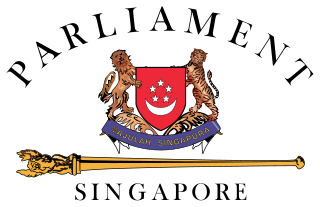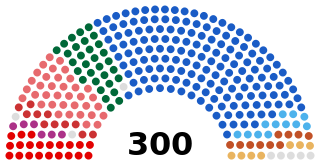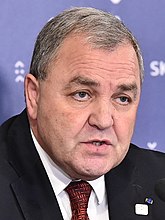
The Parliament of the United Kingdom of Great Britain and Northern Ireland is the supreme legislative body of the United Kingdom, and may also legislate for the Crown Dependencies and the British Overseas Territories. It meets at the Palace of Westminster in London. Parliament possesses legislative supremacy and thereby holds ultimate power over all other political bodies in the United Kingdom and the Overseas Territories. While Parliament is bicameral, it has three parts: the sovereign, the House of Lords, and the House of Commons. The three parts acting together to legislate may be described as the King-in-Parliament. The Crown normally acts on the advice of the prime minister, and the powers of the House of Lords are limited to only delaying legislation.

The politics of Malta takes place within a framework of a parliamentary representative democratic republic, whereby the president of Malta is the constitutional head of state. Executive authority is vested in the president of Malta, with the general direction and control of the Government of Malta remaining with the prime minister of Malta, who is the head of government and the cabinet. Legislative power is vested in the Parliament of Malta, which consists of the president of Malta and the unicameral House of Representatives of Malta with the speaker as the presiding officer of the legislative body. Judicial power remains with the chief justice and the judiciary of Malta. Since independence, the party electoral system has been dominated by the Christian democratic Nationalist Party and the social democratic Labour Party.
The United States Constitution provides that each "House may determine the Rules of its Proceedings," therefore each Congress of the United States, upon convening, approves its own governing rules of procedure. This clause has been interpreted by the courts to mean that a new Congress is not bound by the rules of proceedings of the previous Congress.

The Lok Sabha, also known as the House of the People, is the lower house of India's bicameral Parliament, with the upper house being the Rajya Sabha. Members of the Lok Sabha are elected by an adult universal suffrage and a first-past-the-post system to represent their respective constituencies, and they hold their seats for five years or until the body is dissolved by the President on the advice of the council of ministers. The house meets in the Lok Sabha Chambers of the Parliament House, New Delhi.

The Speaker of the House of Commons is the presiding officer of the House of Commons, the lower house and primary chamber of the Parliament of the United Kingdom. The current speaker, Lindsay Hoyle, was elected Speaker on 4 November 2019, following the retirement of John Bercow. Hoyle began his first full parliamentary term in the role on 17 December 2019, having been unanimously re-elected after the 2019 general election.

The House of Representatives is the sole chamber of the New Zealand Parliament. The House passes laws, provides ministers to form the Cabinet, and supervises the work of government. It is also responsible for adopting the state's budgets and approving the state's accounts.
In parliamentary procedure, a division of the assembly, division of the house, or simply division is a method of taking a vote that physically counts members voting.

In New Zealand, the speaker of the House of Representatives, commonly known as the speaker of the House, is the presiding officer and highest authority of the New Zealand House of Representatives. The individual who holds the position is elected by members of the House from among their number in the first session after each general election. They hold one of the highest-ranking offices in New Zealand. The current Speaker is Gerry Brownlee, who was elected on 5 December 2023.

The speaker of the Senate of Canada is the presiding officer of the Senate of Canada. The speaker represents the Senate at official functions, rules on questions of parliamentary procedure and parliamentary privilege, and presides over debates and voting in the chamber. The office of the speaker is held by Raymonde Gagné who has held the position since May 16, 2023.

The Parliament of Victoria is the bicameral legislature of the Australian state of Victoria that follows a Westminster-derived parliamentary system. It consists of the King, represented by the governor of Victoria, the Legislative Assembly and the Legislative Council. It has a fused executive drawn from members of both chambers. The parliament meets at Parliament House in the state capital Melbourne. The current Parliament was elected on 26 November 2022, sworn in on 20 December 2022 and is the 60th parliament in Victoria.

The Parliament of Singapore is the unicameral legislature of the Republic of Singapore, which governs the country alongside the president of Singapore. Largely based upon the Westminster system, the Parliament is made up of Members of Parliament (MPs) who are elected, as well as Non-constituency Members of Parliament (NCMPs) and Nominated Members of Parliament (NMPs) who are appointed. Following the 2020 general election, 93 MPs and two NCMPs from three political parties were elected to the 14th Parliament. Throughout the sitting of Parliament, nine NMPs are usually appointed by the president on a biennial basis.

The Parliament of the Hellenes, commonly known as the Hellenic Parliament, is the unicameral legislature of Greece, located in the Old Royal Palace, overlooking Syntagma Square in Athens. The parliament is the supreme democratic institution that represents the citizens through an elected body of Members of Parliament (MPs).

The Speaker of the Parliament of Singapore is the presiding officer of the Parliament of Singapore. The speaker is nominated by the prime minister before being appointed by the Parliament. The Speaker is also second in the presidential line of succession. The current Speaker is the People's Action Party MP for Marine Parade GRC, Seah Kian Peng.

The Legislature of the State of Oklahoma is the state legislative branch of the U.S. state of Oklahoma. The Oklahoma House of Representatives and Oklahoma Senate are the two houses that make up the bicameral state legislature. There are 101 state representatives, each serving a two-year term, and 48 state senators, who serve four-year terms that are staggered so only half of the Oklahoma Senate districts are eligible in each election cycle. Legislators are elected directly by the people from single member districts of equal population. The Oklahoma Legislature meets annually in the Oklahoma State Capitol in Oklahoma City.

The House of Representatives is the lower house of the National Assembly of Thailand, the legislative branch of the Thai government. The system of government of Thailand is that of a constitutional monarchy and a parliamentary democracy. The system of the Thai legislative branch is modelled after the Westminster system. The House of Representatives has 500 members, of which 400 are elected through single member constituency elections, while the other 100 are chosen through party lists parallel voting.

The Parliament of Grenada is composed of the monarch and two chambers: the Senate and the House of Representatives. It operates from the New Parliament Building in St. George's.

The speaker of the Legislative Assembly of Queensland is elected by the members of the Queensland Legislative Assembly to preside over sittings of the Assembly and to maintain orderly proceedings. The Speaker must be a member of the Legislative Assembly. The position is currently held by Curtis Pitt, a former Treasurer of Queensland who was elected to the post on 13 February 2018.

The Speaker of the New South Wales Legislative Assembly is the presiding officer of the Legislative Assembly, New South Wales's lower chamber of Parliament. The current Speaker is Greg Piper, who was elected on 9 May 2023.
The President of the New South Wales Legislative Council is the presiding officer of the upper house of the Parliament of New South Wales, the Legislative Council. The presiding officer of the lower house is the speaker of the Legislative Assembly. The role of President has generally been a partisan office, filled by the governing party of the time. As of May 2023, the president is Ben Franklin.

The Sarawak State Legislative Assembly is the legislative chamber of the unicameral legislature of the Malaysian state of Sarawak; the Yang di-Pertua Negeri of Sarawak forms the other part of the legislature. The Assembly is modelled after the traditions of the Westminster parliamentary system, which originates from the practices of the British Parliament. The executive branch of government is drawn from the elected members of the Assembly. The State Legislative Assembly sits at the Sarawak State Legislative Assembly Building located in Petra Jaya in Kuching, the state capital.



















